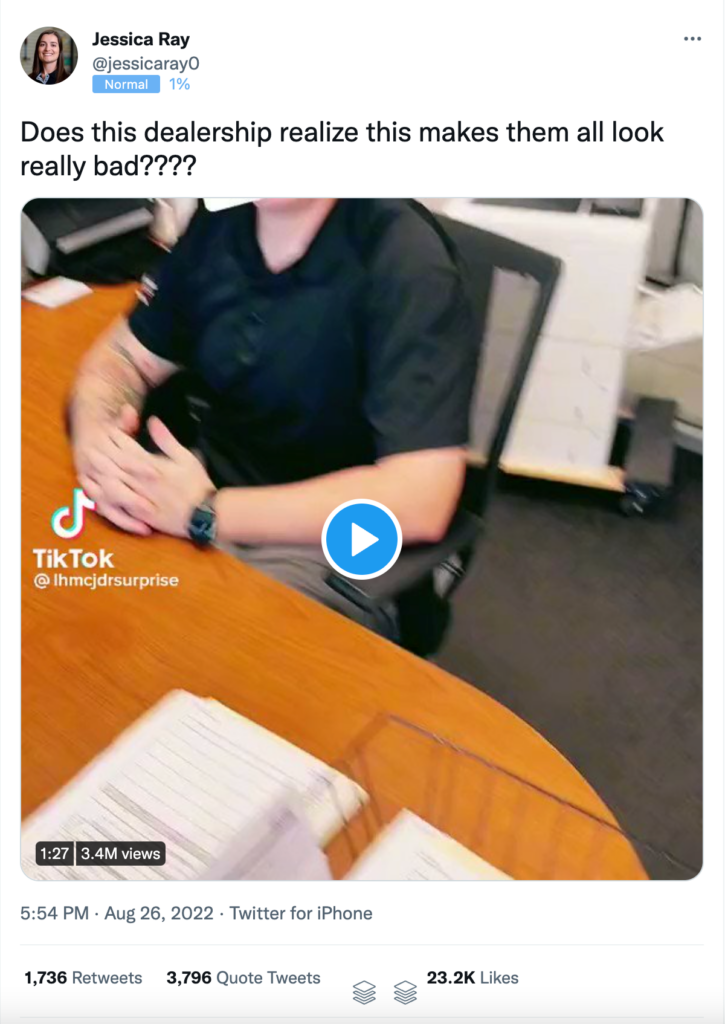
I’ve spent years encouraging automotive social media leaders and dealership personnel to be cautious about social media content. As we witnessed recently, the perfect storm blew in and made those warnings a reality.
Here’s what happened: I follow a lot of automotive people on Twitter. I just happened to notice a video from what looked like a dealership being shared around the group. At that time, it had a few hundred thousand views.
The premise of the video is a roundup of how much dealership employees are paying per month for the vehicles they own, listing only the monthly payment and the car it’s for.
Now, for me, having been in dealerships most of my life, it looked very staged. I’ve known (and managed) literally thousands of dealership employees and very few have brand new models with 4-figure payments. Even given the fact that payments are very high right now (the average sale price of a new vehicle is the highest it’s ever been – $47K), this video looked like somebody at the dealership (the boss? the social media manager?) decided it would be funny and went ahead with making a video.

Read the room, people.
As The Drive put it “Dealership’s showing off big monthly payments backfires”: “Reactions have been mostly negative, for understandable reasons. It’s tone-deaf to publicize your employees’ highest car payments at a time when average monthly car loan payments are skyrocketing.”
“There’s an unsettling “we do it, too” factor to videos like this that acts to normalize gargantuan monthly payments, regardless of whether that was part of the dealership’s intent or not.”
The video has 3.4 million views (as of this writing).
In social media content, humor is not for amateurs.
Humor on social media is only meant for those who can master it. And by master it, I mean a reasonable person would laugh or find humor in your content.
A good sense of humor is one of the traits you’d like to see in a social media manager, but the operative word here is sense.
You don’t have to be funny to have a sense of humor. I have many friends who can’t tell jokes or write funny posts, but they laugh at funny stuff.
Laughter is the shortest distance between two people.
Laughter is a universal means of communication. Humor humanizes an organization. In social media (and all marketing), people pay big bucks to reduce the distance between people so if you can master it successfully, humor rules.
Positive or negative, humor grabs attention.
Humor often stands out from other marketing and advertising attempts because it’s naturally colorful and original. Humor is risky but the payoff is can be so satisfying, which is why so many people attempt it.
- Humor is persuasive.
- People love to spread laughter.
- Making your campaign humorous imbues it with more shareability.
- Funny brands are more relatable and are seen as more trustworthy and human.
- Humor is linked to higher recall, which means any message infused with humor will be easier for your customers to remember.
However, humor in the wrong hands is like quicksand.
- For me, there was a “hostage video” quality to the video with the way the employees were responding.
- The wrong joke at the wrong time can make you look amateurish and unprofessional.
- If people think you’re cracking jokes for the sole purpose of getting more attention, you’ll be seen as exploitative rather than funny.
- Humor can cheapen certain ideas or make them be taken less seriously.
- In some cases, humor can be outright offensive.
- Even bad timing can cause backlash.
The last thing you want is to have your social media content fail and for that failure to go viral…and that, my friends, is what happened with that video.
Through social media content, customers make assumptions.
In reading various posts and comments on social media, I often wonder, “Would they say that if they were here, in person, with a mic on, in a room with thousands of people?” because that’s the equivalent. Except on social media, it’s forever.
When a poorly conceived video goes viral, its lasting effects can destroy a reputation. With Covid-19 supply chain issues leading to shortages in inventory, car prices have skyrocketed. There are forums that share dealer addendum stickers with all sorts of markups further eroding the consumer’s opinion of dealerships. Do we really need to inflict more pain on ourselves with videos that don’t resonate and are not funny?
Even the best of us can fail to realize when jokes we think of as tame are actually hurtful.
What to do instead.
Note: the following is premised on an inclusive, positive dealership culture. If that isn’t present, then choose something else to post (and seriously consider a consultation with a social media/online reputation strategist)
- Plan out your content strategy. Brainstorm ideas so you get differing opinions on the content. In many dealerships, there’s scant attention placed on social media content – it’s “being done by someone.” Don’t publish unless you’ve got a solid content strategy process that includes management’s participation.
- All content should be produced with your customer in mind. Ask yourself: will it resonate? Had someone asked that question in the creation of that video, perhaps someone would’ve sensed that it could be viewed as a) not funny, or b) doesn’t resonate.
- Determine who will be in the video, tell them what it’s about, get their buy-in and make sure they’re comfortable doing it (because if not, it will come through as inauthentic, just like it did on that video). Do you really want to show someone who’s uncomfortable in your video? It’s cringeworthy.
- Instead of forcing a script on each employee, ask them “What’s the one way you made a customer happy?” and make sure they are telling a real story about real customers. Trust me on this, your employees are not actors; they are not equipped to tell a fake story. It will fall flat. If they tell a real story about real customers instead, the honesty and enthusiasm shine through.
- If one of the employee’s stories has a humorous tone, or made the customer laugh, (and it’s tasteful), make sure to include that. Happy, laughing customers are infectious.
- If you’re in doubt about how you look on social media, consider a social media audit. Remember: you don’t want to go viral for the wrong reasons. It takes years to get out from underneath it.
Would you like to learn how to market yourself on social media? Get my FREE Guide: 20 Automotive Social Selling Techniques for More Leads and Sales
